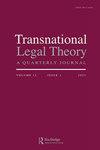COP26是企业食品-气候议程的汇合
Q2 Social Sciences
引用次数: 0
摘要
摘要本文结合对COP26的直接观察和对官方文件的分析得出结论,尽管官方声明中对粮食系统的关注有限,但粮食系统和粮食系统治理是关键。大型食品公司是此次会议的主要赞助商之一,很少组织将技术乐观主义和公私伙伴关系作为粮食和气候议程的银弹的活动,也没有做出可能对粮食未来产生重大影响的承诺。食物没有丢失。缺少的是对问题根源的参与,对粮食系统社会生态复杂性的认识,以及将解决权力失衡和资本主义作为问题一部分的承诺。鉴于这种趋同以及粮食和气候危机的加剧,环境和粮食活动家是否会联合起来,有能力收回企业行为者及其改革议程所选择的空间和叙事?本文章由计算机程序翻译,如有差异,请以英文原文为准。
COP26 as the convergence of the corporate food-climate agendas
ABSTRACT This paper combines direct observation of the COP26 and the analysis of the official documents to conclude that, despite the limited attention that food systems received in the official statements, food systems and food systems governance were key. Large scale food corporations were among the main sponsors of the Conference, few events were organised where techno-optimism and private-public partnerships were proposed as silver bullets for both the food and climate agendas, and pledges were made that may have a significant impact on the future of food. Food was not missing. What was missing was the engagement with the root causes of the problems, the recognition of the socio-ecological complexity of food systems, and the commitment to address power imbalances and capitalism as part of the problem. In light of this convergence and the intensification of the food and climate crises, will environmental and food activists join forces and be capable of reclaiming spaces and narratives that have been co-opted by corporate actors and their reformist agendas?
求助全文
通过发布文献求助,成功后即可免费获取论文全文。
去求助
来源期刊

Transnational Legal Theory
Social Sciences-Law
CiteScore
2.10
自引率
0.00%
发文量
7
期刊介绍:
The objective of Transnational Legal Theory is to publish high-quality theoretical scholarship that addresses transnational dimensions of law and legal dimensions of transnational fields and activity. Central to Transnational Legal Theory''s mandate is publication of work that explores whether and how transnational contexts, forces and ideations affect debates within existing traditions or schools of legal thought. Similarly, the journal aspires to encourage scholars debating general theories about law to consider the relevance of transnational contexts and dimensions for their work. With respect to particular jurisprudence, the journal welcomes not only submissions that involve theoretical explorations of fields commonly constructed as transnational in nature (such as commercial law, maritime law, or cyberlaw) but also explorations of transnational aspects of fields less commonly understood in this way (for example, criminal law, family law, company law, tort law, evidence law, and so on). Submissions of work exploring process-oriented approaches to law as transnational (from transjurisdictional litigation to delocalized arbitration to multi-level governance) are also encouraged. Equally central to Transnational Legal Theory''s mandate is theoretical work that explores fresh (or revived) understandings of international law and comparative law ''beyond the state'' (and the interstate). The journal has a special interest in submissions that explore the interfaces, intersections, and mutual embeddedness of public international law, private international law, and comparative law, notably in terms of whether such inter-relationships are reshaping these sub-disciplines in directions that are, in important respects, transnational in nature.
 求助内容:
求助内容: 应助结果提醒方式:
应助结果提醒方式:


